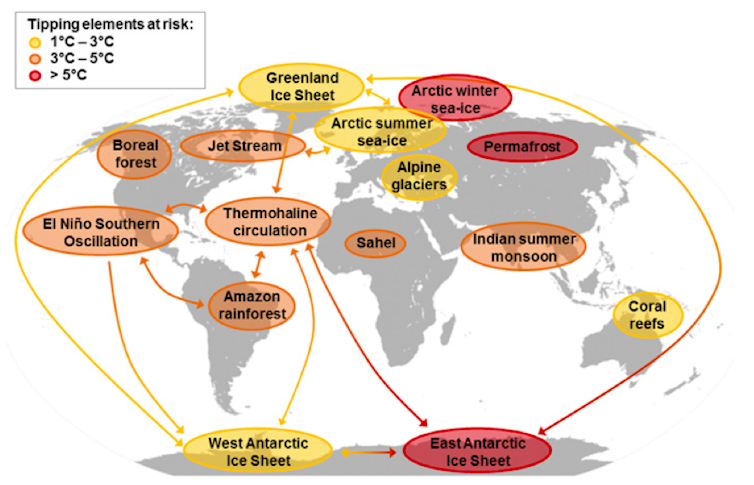Here we are in the middle of the second year of Donald Trump's presidency and if there's one thing we know by now, it's that the leader of the free world can create an instant reality-TV show on geopolitical steroids at will. True, he's not polished in his demeanor, but he has an unerring way of instilling the most uncertainty in any situation in the least amount of time.
Whether through executive orders, tweets, cable-news interviews, or rallies, he regularly leaves diplomacy in the dust, while allegedly delivering for a faithful base of supporters who voted for him as the ultimate anti-diplomat. And while he's at it, he continues to take a wrecking ball to the countless political institutions that litter the Acela Corridor. Amid all the tweeted sound and fury, however, the rest of us are going to have to face the consequences of Donald Trump getting his hands on the economy.
According to the Merriam-Webster dictionary, entropy is "a process of degradation or running down or a trend to disorder." With that in mind, perhaps the best way to predict President Trump's next action is just to focus on the path of greatest entropy and take it from there.
Let me do just that, while exploring five key economic sallies of the Trump White House since he took office and the bleakness and chaos that may lie ahead as the damage to the economy and our financial future comes into greater focus.
1. Continuous Banking Deregulation
When Trump ran for the presidency, he tapped into a phenomenon that was widely felt but generally misunderstood: a widespread anger at Wall Street and corporate cronyism. Upon taking office, he promptly redirected that anger exclusively at the country's borders and its global economic allies and adversaries.
His 2016 election campaign had promised not to "let Wall Street get away with murder" and to return the banking environment to one involving less financial risk to the country. His goal and that of the Republicans as a party, at least theoretically, was to separate bank commercial operations (deposits and lending) from their investment operations (securities creation, trading, and brokerage) by bringing back a modernized version of the Glass-Steagall Act of 1933.
Fast forward to May 18, 2017 when Trump's deregulatory-minded treasury secretary, "foreclosure king" Steven Mnuchin, faced a congressional panel and took a 180 on the subject. He insisted that separating people's everyday deposits from the financial-speculation operations of the big banks, something that had even made its way into the Republicanplatform, was a total nonstarter.
Instead, congressional Republicans, with White House backing, promptly took aim at the watered-down version of the Glass-Steagall Act passed in the Obama years, the Dodd-Frank Act of 2010. In it, the Democrats had already essentially capitulated to Wall Street by riddling the act with a series of bank-friendly loopholes. They had, however, at least ensured that banks would set aside more of their own money in the event of another Great Recession-like crisis and provide a strategy or "living will" in advance for that possibility, while creating a potent consumer-protection apparatus, the Consumer Financial Protection Bureau (CFPB). Say goodbye to all of that in the Trump era.
Dubbed "the Choice Act" — officially the Economic Growth, Regulatory Relief, and Consumer Protection Act — the new Republican bill removed the "living will" requirement for mid-sized banks, thereby allowing the big banks a gateway to do the same. When Trump signed the bill, hesaidthat it was "the next step in America's unprecedented economic comeback. There's never been a comeback like we've made. And one day, the fake news is going to report it."
In fact, thanks to the Trump (and Republican) flip-flop, banks don't need to defend themselves anymore. The president went on to extol the untold virtues of his pick to run the CFPB, meant to keep consumers from being duped (or worse) by their own banks. Before Trump got involved, it had won $12 billion in settlements from errant banks for the citizens it championed.
However, Kathy Kraninger, a former Homeland Security official tapped by Trump to run the entity, has no experience in banking or consumer protection. His selection follows perfectly in the path of current interim head Mick Mulvaney (also the head of the Office of Management and Budget). All you need to know about him is that he once derided the organization as a "sick, sad" joke. As its director, he's tried to choke the life out of it by defunding it.
In this fashion, such still-evolving deregulatory actions reflect the way Trump's anti-establishment election campaign has turned into a full-scale program aimed at increasing the wealth and power of the financial elites, while decreasing their responsibility to us. Don't expect a financial future along such lines to look pretty. Think entropy.
2. Tensions Rise in the Auto Wars
Key to Trump's economic vision is giving his base a sense of camaraderie by offering them rallying cries from a bygone era of nationalism and isolationism. In the same spirit, the president has launched a supposedly base-supporting policy of imposing increasingly random and anxiety-provoking trade tariffs.
Take, for instance, the automotive sector, which such tariffs are guaranteed to negatively impact. It is ground zero for many of his working-class voters and a key focus of the president's entropic economic policies. When he was campaigning, he promised many benefits to auto workers (and former auto workers) and they proved instrumental in carrying him to victory in previously "blue" rust-belt states. In the Oval Office, he then went on to tout what he deemed personal victories in getting Ford to move a plant back to the US from Mexico while pressuring Japanese companies to make more cars in Michigan.
He also began disrupting the industry with a series of on-again-off-again, imposed or sometimes merely threatened tariffs, including on steel, that went against the wishes of the entire auto sector. Recently, Jennifer Thomas of the industry's main lobbying group, the Alliance of Automobile Manufacturers, assured a Commerce Department hearing that "the opposition is widespread and deep because the consequences are alarming."
Indeed, the Center for Automotive Research has reported that a 25% tariff on autos and auto parts (something the president has threatened but not yet followed through upon against the European Union, Canada, and Mexico) could reduce the number of domestic vehicle sales by up to two million units and might wipe out more than 714,000 jobs here. Declining demand for cars, whose prices could rise between $455 and $6,875, depending on the type of tariff, in the face of a Trump vehicle tax, would hurt American and foreign manufacturers operating in the US who employ significant numbers of American workers.
Though President Trump's threat to slap high tariffs on imported autos and auto parts from the European Union is now in limbo due to a recent announcement of ongoing negotiations, he retains the right if he gets annoyed by… well, anything… to do so. The German auto industry alone employs more than 118,000 people in the US and, if invoked, such taxes would increase its car prices and put domestic jobs instantly at risk.
3. The Populist Tyranny of the Trump Tax Cuts
President Trump has been particularly happy about his marquee corporate tax "reform" bill, assuring his base that it will provide jobs and growth to American workers, while putting lots of money in their pockets. What it's actually done, however, is cut the corporate tax rate from 35% to 21%, providing corporations with tons of extra cash. Their predictable reaction has not been to create jobs and raise wages, but to divert that bonanza to their own coffers via share buybacks in which they purchase their own stock. That provides shareholders with bigger, more valuable pieces of a company, while boosting earnings and CEO bonuses.
Awash in tax-cut cash, American companies have announced a record $436.6 billion worth of such buybacks so far in 2018, close to double the record $242.1 billion spent in that way in all of 2017. Among other things, this ensures less tax revenue to the US Treasury, which in turn means less money for social programs or simply for providing veterans with proper care.
As it is, large American companies only pay an average effective tax rate of 18% (a figure that will undoubtedly soon drop further). Last year, they only contributed 9% of the tax receipts of the government and that's likely to drop further to a record low this year, sending the deficit soaring. In other words, in true Trumpian spirit, corporations will be dumping the fabulous tax breaks they got directly onto the backs of other Americans, including the president's base.
Meanwhile, some of the crew who authored such tax-policies, creating a $1.5 trillion corporate tax give-away, have already moved on to bigger and better things, landing lobbying positions at the very corporations they lent such a hand to and which can now pay them even more handsomely. For the average American worker, on the other hand, wages have not increased. Indeed, between the first and second quarters of 2018 real wages dropped by 1.8% after the tax cuts were made into law. Trump hasn't touted that or what it implies about our entropic future.
4. Trade Wars, Currency Wars, and the Conflicts to Come
If everyone takes their toys to another playground, the school bully has fewer kids to rough up. And that's exactly the process Trump's incipient trade wars seem to be accelerating — the hunt for new playgrounds and alliances by a range of major countries that no longer trust the US government to behave in a consistent manner.
So far, the US has already slapped $34 billion worth of tariffs on Chinese imports. China has retaliated in kind. Playing a dangerous global poker game, Trump promptly threatened to raise that figure to at least$200 billion. China officially ignored that threat, only inciting the president's ire further. In response, he recently announced that he was "willing to slap tariffs on every Chinese good imported to the US should the need arise." Speaking to CNBC's Squawk Box host Joe Kernen on July 20th, he boasted, "I'm ready to go to 500 [billion dollars]."
That's the equivalent of nearly every import the Chinese sent into the US last year. In contrast, the US exports only $129.9 billion in products to China, which means the Chinese can't respond in kind, but they can target new markets, heighten the increasingly tense relations between the world's two economic superpowers, and even devalue their currency to leverage their products more effectively on global markets.
Global trade alliances were already moving away from a full-scale reliance on the US even before Donald Trump began his game of tariffs. That trend has only gained traction in the wake of his economic actions, including his tariffs on a swath of Mexican, Canadian, and European imports. Recently, two major American allies turned a slow dance toward economic cooperation into a full-scale embrace. On July 17th, the European Union and Japan agreed on a mega-trade agreement that will cover one-third of the products made by the world economy.
Meanwhile, China has launched more than 100 new business projects in Brazil alone, usurping what was once a US market, investing a record $54 billion in that country. It is also preparing to increase its commitments not just to Brazil, but to Russia, India, China, and South Africa (known collectively as the BRICS countries), investing $14.7 billion in South Africa ahead of an upcoming BRICS summit there. In other words, Donald Trump is lending a disruptively useful hand to the creation of an economic world in which the US will no longer be as central an entity.
Ultimately, tariffs and the protectionist policies that accompany them will hurt consumers and workers alike, increasing prices and reducing demand. They could force companies to cut back on hiring, innovation, and expansion, while also hurting allies and potentially impeding economic growth globally. In other words, they represent an American version of an economic winding down, both domestically and internationally.
5.Fighting the Fed
President Trump's belligerence has centered around his belief that the wealthiest, most powerful nation on the planet has been victimized by the rest of the world. Now, that feeling has been extended to the Federal Reserve where he recently lashed out against its chairman (and his own appointee) Jerome Powell.
The Fed had been providing trillions of dollars of stimulus to the banking system and financial markets though a bond-buying program wonkily called "quantitative easing" or "QE." Its claim: that this Wall Street subsidy is really a stimulus for Main Street.
Unlikely as that story may prove to be, presidents have normally refrained from publicly commenting on the Federal Reserve's policies, allowing it to maintain at least a veneer of independence, as mandated by the Federal Reserve Act of 1913. (In reality, the Fed has remained significantly dependent on the whims and desires of the White House, a story revealed in my new book Collusion.) However, this White House is run by a president who couldn't possibly keep his opinions to himself.
So far, the Fed has raised (or "tightened") interest rates seven times since December 2015. Under Powell, it has done so twice, with two more hikes forecast by year's end. These moves were made without Trump's blessing and he views them as contrary to his administration's economic objectives. In an interview with CNBC, he proclaimed that he was "not thrilled" with the rate hikes, a clear attempt to directly influence Fed policy. Sticking with tradition, the Fed offered no reaction, while the White House quickly issued a statement emphasizing that the president "did not mean to influence the Fed's decision-making process."
Ignoring that official White House position, the president promptly took toTwitterto express his frustrations with the Fed. ("[T]he United States should not be penalized because we are doing so well. Tightening now hurts all that we have done. The US should be allowed to recapture what was lost due to illegal currency manipulation and BAD Trade Deals. Debt coming due & we are raising rates — Really?")
Fed Chairman Powell may want to highlight his independence from the White House, but as a Trump appointee, any decisions made in the framework of the president's reactions could reflect political influence in the making. The bigger problem is that such friction could incite greater economic uncertainty, which could prove detrimental to the economic strength Trump says he wants to maintain.
When Entropy Wins, the World Loses
Trump's method works like a well-oiled machine. It keeps everyone — his cabinet, the media, global leaders, and politicians and experts of every sort — off guard. It ensures that his actions will have instant impact, no matter how negative.
Economically, the repercussions of this strategy are both highly global and extremely local. As Senator Ben Sasse (R-NE) noted recently, "This trade war is cutting the legs out from under farmers and [the] White House's 'plan' is to spend $12 billion on gold crutches… This administration's tariffs and bailouts aren't going to make America great again, they're just going to make it 1929 again."
He was referring to the White House's latest plan to put up to $12 billion taxpayer dollars into those sectors of American agriculture hit hardest by Trump's tariff wars. Let that sink in for a moment and think: entropy. In order to fix the problems the president has created, allegedly to help America become great again, a deficit-ridden government will have to shell out extra taxpayer dollars.
Subsidizing farmers isn't in itself necessarily a bad thing. It is, in fact, very New Deal-ish and Franklin Delano Roosevelt-esque. But doing so to fix an unnecessary problem? Under such circumstances, where will it stop? When those $200 billion or $500 billion in tariffs on China (or other countries) enflames the situation further, who gets aid next? Auto workers? Steel workers?
What we are witnessing is the start of the entropy wars, which will, in turn, hasten the unwinding of the American global experiment. Each arbitrary bit of presidential pique, each tweet and insult, is a predecessor to yet more possible economic upheavals and displacements, ever messier and harder to clean up. Trump's America could easily morph into a worldwide catch-22. The more trust is destabilized, the greater the economic distress. The weaker the economy, the more disruptable it becomes by the Great Disrupter himself. And so the Trump spiral spins onward, circling down an economic drain of his own making.
Nomi Prins is a journalist, speaker, respected TV and radio commentator, and former Wall Street executive. Her latest book is Collusion: How Central Bankers Rigged the World.
Tom Engelhardt launched Tomdispatch in November 2001 as an e-mail publication offering commentary and collected articles from the world press. In December 2002, it gained its name, became a project of The Nation Institute, and went online as "a regular antidote to the mainstream media." The site now features Tom Engelhardt's regular commentaries and the original work of authors ranging from Rebecca Solnit, Bill McKibben, and Mike Davis to Chalmers Johnson, Michael Klare, Adam Hochschild, Robert Lipsyte, and Elizabeth de la Vega. Nick Turse, who also writes for the site, is associate editor and research director. Tomdispatch is intended to introduce readers to voices and perspectives from elsewhere (even when the elsewhere is here). Its mission is to connect some of the global dots regularly left unconnected by the mainstream media and to offer a clearer sense of how this imperial globe of ours actually works.



